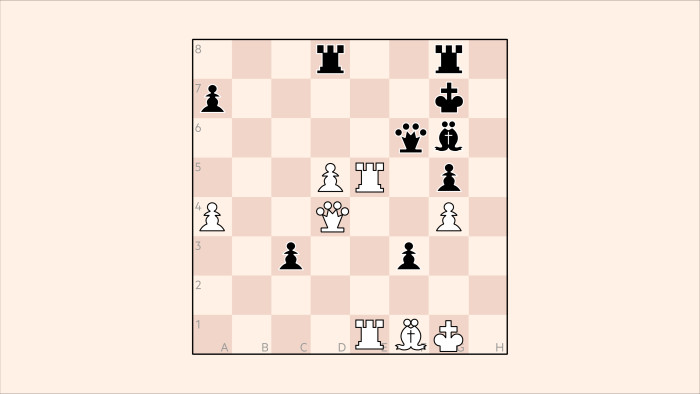Chess: Ding Liren captures world crown after dramatic tie-break

After one of the most dramatic and combative title matches for decades, Ding Liren became China’s first overall world champion, and the 17th in the historic series, on Sunday. The 30-year-old world No 3 from Wenzhou defeated Russia’s world No 2 Ian Nepomniachtchi by 2.5-1.5 in a rapid chess tie-break after their 14 classical games ended in a 7-7 deadlock.
The four games on the final day, shown live on the internet, attracted a huge global audience, with a peak figure of more than 570,000 viewers. Ding earned €1.1mn and Nepomniachtchi €900,000.
China already holds the individual women’s world title, and both their Olympiad teams won gold on their last appearance in 2020, so the result marks a further break-through in a country where Chinese chess (Xiangqi) remains more popular than the international version.
The outcome was a remarkable recovery by Ding, who had started badly with a nervous defeat in game two, was behind several times, and seemed booked to go two down with two to play in the error-strewn 12th game before Nepomniachtchi blundered a key pawn and allowed Ding’s army to invade his defences. That was the story of the match for the 32-year-old from Bryansk, who repeatedly spoiled good positions.
Nepomniachtchi admitted later that “I had every chance. I had so many promising positions, and should have tried to finish everything in the classical portion, because it was a matter of one or two precise moves, both in round 12 and 14. But once it went to tiebreaks it’s always a lottery, especially after a 14-game match. Probably my opponent made the penultimate mistake, so that’s it.”
Ding said: “I’m relieved. The moment Ian resigned the game was very emotional. I could not control my moods and feelings, and burst into tears. It was quite a tough tournament for me, and I would like to thank my friends.”
The final tie-break game was the only occasion in the entire match when Ding took an overall lead, a unique occurrence in all the 49 world championship matches dating back to 1886. The defining moment in the fourth tiebreak game was 46...Rg6! self-pinning his own rook against his king and avoiding the draw by perpetual check which had been anticipated by the commentators and by Nepomniachtchi. Magnus Carlsen, who had abdicated his crown after a 10-year reign, sent a tweet reading “Self-pinning for immortality. Congrats Ding!”
There were still another 22 moves, including mutual time pressure mistakes, and as late as move 59 Nepomniachtchi could have forced perpetual check by sacrificing his bishop at g7. After the Russian missed that fleeting opportunity, Ding’s inexorably advancing passed pawns sealed victory.
Ding’s championship campaign often teetered on the brink of elimination, but fate or the chess gods repeatedly stepped in to help him. He missed a place in the 2022 Candidates, but Sergey Karjakin was banned for his comments about the invasion of Ukraine. Ding then played 28 games in a month to reactivate his rating after the pandemic lockdown.
He started badly in the Candidates before a late surge put him into contention In the final round. There Hikaru Nakamura had an easy draw, but the five-time US champion drifted into defeat and Ding took second to Nepomniachtchi, which became a place in the title match when Carlsen refused to take part. Finally, in the match itself, Nepomniachtchi missed around a dozen chances to secure clear or decisive advantages.
The €2mn match in the Kazakh capital Astana began under a cloud due to Carlsen’s abdication and the legendary Garry Kasparov’s verdict that it was an “amputated” event, but the mutual fighting spirit and its seven decisive games contrasted so sharply with Carlsen’s glut of draws in his 2016 and 2018 title defences that the majority of chess fans were won over.
There are still sceptics who believe that there were just too many errors by the historic standards of previous world championships. That is a conclusion that is likely to encourage the new generation of teenage talents who are currently advancing towards and into the world top 20. They are led by France’s world No4, Alireza Firouzja, 19, and include Uzbekistan’s Nodirbek Abdusattorov, 18, and India’s Dommaraju Gukesh, 16. This trio will all now have their sights on the 2024 Candidates and becoming the 2025 challenger to Ding.
Puzzle 2518
Ding Liren v Wang Hao, Ningbo 2011. White to move and win.
Click here for solution
Comments